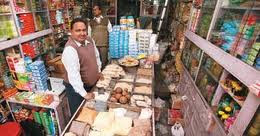Every foreigner residing in India discovers things don’t work the same here as they do back home, especially if “home” is America or Europe. You have to learn a new way of navigating the tasks taken for granted elsewhere: where to buy groceries or any of the things needed to furnish your home, how to get around, how to hire someone to fix things or find the basics needed to do the job yourself, how to set up telephone service and what to do when it doesn't work. For the new expat, it’s all a big hassle but also part of the adventure of living in a new country, East or West.
I asked an Indian friend who lived in the US for twenty years what he missed most about America and he answered, “Home Depot.” I laughed but after thinking about it, I saw his point. “Do it yourself” types like me are not the norm here where homeowners typically call an electrician to change a light bulb. I often find myself stumped not because I don’t know how to fix something but because I don’t have the right materials, can't find the proper tools and getting either is such a tremendous hassle. I believe anything can be bought in India but finding it easily it near impossible, at least for a foreigner. My solution in Pune, early on when I was new there and trying to get things built at our community, was to hire one fellow whose job was simply to find things for me in the market districts and then lead me to them. I turned a blind eye to the fact he would then go back to the store owner and get a kick back for bringing me in.
In India, big, multi-brand retail outlets like you find in the West are rare and where they do exist, they are nothing of the scale you would find in the United States. The entire Croma store, a very nice electronics and home applieance outlet near our ashram, is a fraction of the size of any Sears store at an American mall. And just so you understand, even Croma-type stores are not common. We have one close to where I live because our area of Gurgaon is “up-scale” enough to warrant it. In India, shops are typically small and locally owned, often specializing in a narrow line of products with limited selection. There was one shop in Pune I liked that sold only nuts and bolts, but not screws. If you needed a special bolt of any size or style, he probably had it, but getting to his shop demanded a special trip. If I wanted a selection of screws beyond the most basic, I’d go to the screw shop; for a good screwdriver, a special tool shop. So it went for most everything. If you have time and you know your way around, it can be a fun throw-back to the way things used to be in America long ago or still found in small towns. That was a time when you knew your local shop keeper and had time for tea and a chat, when services were provided by people you knew and where customers were greeted by the owner of the store. A part of me misses that, but if you lack time or local knowledge, it’s exasperating.
I mention all of the above because there is a national debate raging here about whether India should allow foreign, multi-brand retail outlets into the Indian market. This can be summed up with one word—Walmart. For now, foreign companies are not allowed to start multi-brand retail
stores in India but some in government would like to ease that restriction so that foreign companies can have a 51% ownership stake in such enterprises. The proposal has unleashed an uproar of hot debate and political maneuvers. For now, it looks like the proposal will be shelved because of the fierce opposition but my guess is that it's only a matter of time before the issue resurfaces. Will India follow the lead of most other majore Asian economies (China, Indonesia, Malaysia) who have welcomed the “big boys” into the neighborhood or will it go its own way.
A lot is at stake in the issue, whether you support or oppose the government's decision. Those against FDI (Foreign Direct Investment) in Retail represent a powerful constituency of small shop (known as kirana stores) owners and the middlemen who supply them. The retail industry is the second largest contributor, after agriculture, to the national economy with countless small shops a feature of the urban landscape. They fear supermarkets and large retail outlets will drive them out of business and completely change the commercial landscape, destroying their livelihoods and replacing them with an army of drone salesboys marching to the tune of Big Brother Walmart. The infrastructure of middlemen, traders and central markets (mandis) could be at risk and India's cultural identity might wither, or so they claim. Populists have threatened to set fire to the first such stores that dare come into their neighborhoods. Others see the “hidden hand” of neo-colonialism once again subverting the land. “The British came to India as traders two hundred years ago and look what happened. Do we want to do it again?” “Do we want to go the way of the West?”
Economists and mobile consumers are on the other side of the argument. Big retail represents modernity. I'd put farmers as being if favor too but, as usual, they are unorganized and remain silent, letting others claim they speak for their interests. Proponents of economic liberalization say FDI in Retail will bring much needed efficiency to supply chains, a reduction in consumer costs, raise farm income, and increase selection. The arguments about jobs are complex. If the economy expands as predicted, there will be more jobs in the new sectors but those in the old could decrease. It's good to remember that a “job” and a “livelihood” are not the same.
A couple of significant points are more difficult for the average citizen to understand. Multinationals such as Tesco, Carrefour and Walmart are attractive becauese they bring in huge amounts of capital to invest in infrastructure such as efficient distribution systems, trucking, cold storage for fresh produce, supply networks and all the other things that are behind the scenes. With interest rates rising in India, local firms simply don't have the clout to do this on their own. The law would mandate a percentage of products be locally sourced and, considering the low cost of Indian labor, I would expect Indian manufacturers to benefit, similar to what has happened in China and Indonesia after their markets opened. Secondly, and perhaps of greater long term impact, Indian companies are eager to partner with the big multinationals to learn their systems and adopt their technology. Companies such as Walmart have cutting edge distribution networks and expertise second to none.
My opinion is that large, multi-brand retail stores are inevitable because of their economic efficiencies but there is little doubt, in my mind, that they will also be revolutionary. They will bring change. Is that good or bad? That's where the problem lies; they will upset the status quo. India must decide. The question, to my mind, is not if large retail comes to
India but when. It seems to me just a matter of timing. Indian companies can already engage in large retail if they have the will and resources to do so. Only foreign owned firms are prohibited. I expect local comglomerates will slowly expand their operations to create Indian versions of Walmart, Costco and Home Depot. Already Reliance Industries has opened grocery chains in many big cities but it will just take much, much longer for domestic companies to equal what Walmart could do in a short time. Can India afford to sit on the sidelines. (It should be noted that multi-brand outlets must also receive permission from state governments to operate. Some states prohibit even Indian companies from opening large, multi-brand stores.)
I'm reminded of when I visited India in 1995 and most of the cars where old-style, dumpy Ambassadors that hadn't changed much since the British left India in the late '40's. Foreign automobile firms weren't allowed into the country. When foreign investment was allowed a few years later, everything changed, car ownership exploded, pollution decreased, prices dropped, selection increased and almost everyone junked their Ambassadors except for government officials who can still be seen cruising around town, flags flying on the fenders of the old stand-bys.
I should mention that foreign owned "single-brand retail" is permitted even though multi-brand is not. That is why you will see a Levi's or Gap store in the local mall. All of the products in those stores are sold under the one brand. The Levi store cannot sell Lee jeans or Wranglers. The rules for ownership now allow 100% ownership of these stores by foreign firms, making it likely a big IKEA store or something like it will soon pop up in Delhi. Walmart has been allowed, in partnership with an Indian firm, to set up a few wholesale outlets in strategic cities to supply the local kirana stores and seem to be popular, although local firms accuse them of selling to retail customers on the sly.
One final consideration is a worrying phenomena I've mentioned before (The Price of Onions). Inflationary pressure is pushing food costs higher at a pace faster than in other sectors of the economy. This seriously affects the poor because they must spend a high percentage of their income (50%-75%) on food. While India modernizes right and left in the cites, agriculture lags behind because of inefficiencies, out-dated regulations, lack of infrastructure and entrenched interests. Something needs to change. Whether the answer is foreign investment or some sort of domestic initiative remains to be seen but for India's sake, I hope it addresses the problem conscoiously rather than tempting fate by waiting. Alas, I suspect nothing much will happen.
Thursday, December 8, 2011
Subscribe to:
Posts (Atom)





